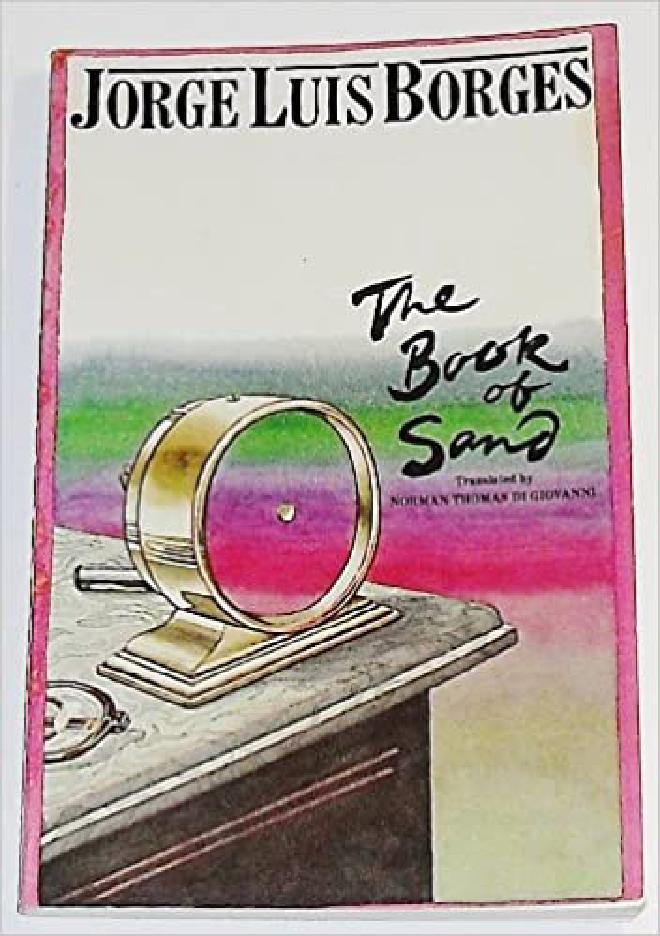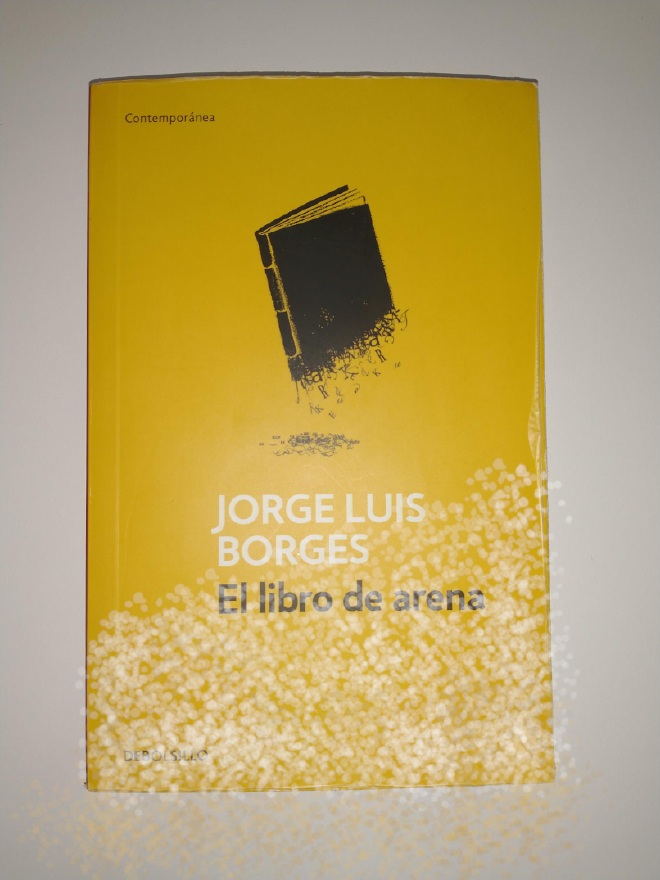Intro #
It makes me proud to make “The Book of Sand” the first book I write about on my blog. I hope to not do it an injustice with the scantness of my words.

The book is written by the famous Argentinian author Jorge Luis Borges but he is so renowned that it is enough to just say Borges. His full name is much longer and makes for a tongue twister: Jorge Francisco Isidoro Luis Borges Acevedo. No need for that unless you find yourself reading one of his books and become quite angry with him. Then you can yell his name like any angry parent would.

The book is, or seems to be, a collection of short stories that are oddly related to each other even if at times I was unsure of how exactly they were related. The relation might simply be no more than that they happen to be together in the same book. Each short story is more than a little weird in its own way.
So that you can glimpse the weirdness here are two examples of many you will find if you are curious enough to want to read it yourself.
Weirdness 1 #
One of the short stories is titled after the book itself, “The Book of Sand”, and it is about a man that buys a book with an infinite number of pages. However, the book is magical in a way. Once the man flips to a page he is no longer able to return to it if he flips away; the magic of the book prevents it. As it is, if anyone possessed this book they would have but one chance to read a page they opened to or have it be lost forever.
Weirdness 2 #
The second example is from the story titled “The mirror and the mask”. A bard is asked to compose an epic poem for a king. The bard has three attempts to compose a great poem to describe the king’s legendary feats. In the end it seems the poem itself is as great, if not greater, than the feats themselves as it causes the death of one man and the enlightenment of another.
Below are my favorite quotes from the book with my own commentary about them. I won’t say where exactly where they’re from to avoid any undue spoilers. Also, I read the Spanish version and include the original Spanish and my own English translation because I don’t have an English copy of the book.
Favorite Quotes #
Te llamaré Sigurd -declaró con una sonrisa.
Si soy Sigurd -le repliqué- tú serás Brynhild.
“I shall call you Sigurd,” she declared with a smile.
“If I’m Sigurd you will be Brynhild,” I replied.
I attempted to read this book of sand man years ago and only made it through the first story. I might have read the second story.
I did not understand these lines at the time. However, since then I learned, through a roundabout way, just who exactly Sigurd and Brynhild actually are. To reread this story and understand it more deeply due to this was immensely pleasing.
Sigurd and Brynhild are characters in a very famous Norse/Icelandic legend: The Völsunga Saga. Now that I’ve read the saga I can say that Brynhild is a Valkyrie and Sigurd is a dragon-slaying hero. As it happens, Sigurd is also in an anime named Fate/Apocrypha that I’ll write about some other time, although, in the anime he is known by his German name Siegfried instead. Well, enough about that.
Irala preguntó dónde estaba el baño; don Alejandro con un vasto ademán, le mostró el continente. La noche era de luna; salí a dar vuelta y lo sorprendí, vigilado por un ñandú.
Irala asked where the bathroom was. With a great sweeping gesture don Alejandro showed him the entire continent. That moonlit night I went for a stroll and stumbled onto him while being spied upon by a rhea.
This is a funny because I enjoy camping and have had the chance of using our great continent for cleansing myself as Irala did. Unlike him, I did not have the pleasure of being spied upon by a rhea.

Prescindió, en lo posible, de la gramática y de las oraciones fabricadas para el aprendizaje y entramos directamente en la poesía, cuyas formas exigen la brevedad.
He dispensed with, where possible, the grammar and sentences that were fabricated for learning and instead jumped straight into poetry, a form of writing that demands brevity.
If you’ve ever written poetry, or attempted it, you know the last part of this statement to be true. There is no room for extra in poems. Just as there is no more room here to go on about it. Better to discover this on one’s own.
-Cada tantos siglos hay que quemar la Biblioteca de Alejandría.
Every few centuries the Library of Alexandria has to be burned.
Oh god! No, I hope not. The idea of there being a library that contains all the knowledge worth knowing and then burning it to the ground is a very scary idea indeed. Although, I can see that it might be necessary.
In fact, if we think of ourselves as libraries of memory and experience, I’m sure that we’ve all had things in our pasts we’d like very much to be rid of and burn away. In that sense, yes, every few years the Library of Self has to be burned.
Senti lo que sentimos cuando alguien muere: la congoja, ya inútil, de que nada nos hubiera costado haber sido más buenos.
I felt what we feel when someone dies: the distress, altogether useless by then, that it would have cost us nothing to have been better.
I have yet to live through a significant death, though I know that can’t be avoided forever, unless I make sure I’m the first to go. Regardless, even though I have not lived it, I have felt lesser forms of this distress in my life.
It’s that feeling that if I had done something a little differently I would esteem myself more highly, that I would have left a better impression upon the world than the pale impression I’ve made until now. I hope to avoid this if I live through a significant death but I know that the desire to avoid it is fantastical hubris.
Yo había previsto ese fracaso, pero una cosa es prever algo y otra que ocurra.
I had foreseen the failure, but it’s one thing to foresee something and another to have it happen.
I know this all too well. I can very well imagine a devastating circumstance will arise, but it’s an entirely different thing to have your fears come to life and materialize before you. At that point I hope my heart can keep up with the dance.
La curiosidad pudo más que el miedo y no cerré los ojos.
My curiosity was greater than my fear and I kept my eyes open.
If you haven’t experienced this then it’s hard to transmit through text. It’s like watching a scary movie and you get to the scariest part of the movie. You know it’s the scariest part and you might very well be afraid to look and feel as if you’ll turn away, but you’re curious and that makes your eyes incapable of closing at the critical moment in the plot.
Sé la Verdad pero no puedo razonar la Verdad. El inapreciable don de comunicarla no me ha sido otorgado.
I know the Truth but I can’t reason about the Truth. The priceless gift of communicating it has not been granted to me.
To know something with such certainty but to not be able to explain it or to even give it proper form in words. It’s a most frustrating thing!! If only I could pluck the right words out of my head and arrange them in the right way every time. If only, then I’d be unstoppable.
Jordan Peterson might call this unarticulated knowledge. It’s there in ourselves. We know it but don’t know how to say it exactly and if we would try we would fumble around with our words. At the end we’re left wondering if the other person is getting any of what we have said. We might be left wondering if even we know what we’ve said.
I oftentimes have to explore and play with the words before I can land on what I actually want to say. I allow myself that freedom when I’m alone, though when I’m with others I try to do it much less. Others don’t take took kindly to verbal exploration because along the way I might say things that aren’t pleasing. Although my friends still stick around for one reason or another and I thank you. One reason is likely that they enjoy having a conversation.
Las proezas más claras pierden su lustre si no se les amoneda en palabras.
The greatest of feats lose their shine if they are not minted in words.
Amazing. All the legends not sung of or written down have simply been forgotten. Simple yet true. Which feats will I achieve and which of those will make it into written form to live on and be worth telling? Not to mention the question of if they’ll stand against the feats of many others in this world.
What about you, dear reader, what will your feats and legend be?
Siempre uno acaba por asemejarse a sus enemigos.
One always ends up becoming like our enemies.
I’m not sure exactly why this one captured my attention. It might be because I know it can be very tempting to adopt qualities you don’t want to when you compete with others. The answer or the way out of this is to not compete with others. Instead, make an enemy of yourself and beat what came before. Even so, to best yourself you will have to take on qualities that you have considered to not be you at all. How would I best myself otherwise?
Recuerdo que sin contradecirme una sola vez corrigió mis muchos errores y temerarias presunciones.
I remember that without contradicting even once he corrected many of my errors and rash suppositions.
The art of pleasant argument is a gift I have never focused on but I recognize to be an amazing talent. This relates to the quote above about the Truth and not having a way to express it artfully through normal conversation.
A todos la vida les da todo pero los más lo ignoran.
Life gives everything to everyone but most everyone ignores it.
It makes me wonder how many things I have ignored in life that, if had I not, would mean I would have a more bountiful life.
…Este acto de justicia me pertenece. Ahora, que me juzguen.
…This act of justice is mine. Now then, let them judge me.
Ah! This one is a good one from a really interesting story. The intrigue about this quote is that the character accepts that others will judge him for what he has done, even though he himself declares it an act of justice, and thus good.
His beliefs and own judgment led him there and he accepts in full the consequences. The most of us behave this way I suppose. I just hope I’m more right about the way I’ve behaved than my past self.
No lo encontré. Hace años que sigo buscando.
I didn’t find it. I’ve been looking for years.
You see, in the story the character loses an object. At least that much should be apparent. How much of ourselves do we lose throughout the years? We sacrifice pieces of ourselves to move forward. We let go of behaviors that don’t serve us and memories that pain us. I hope I don’t end up like the character in the book; looking endlessly for something I thought lost and wasting away while the seasons change.
Prisionero del libro, casi no me asomaba a la calle.
Imprisoned by the book, I didn’t dare to go outside.
One of the best quotes from this book that Borges gave us is this one. It ties into something I heard a lecturer say on a Youtube video: People don’t have ideas. Ideas have people.
Similarly, books are used to capture ideas. Books let us provide an etching of them and then to also flesh them out. The ideas live longer than their authors and whosoever should read them could become trapped by them, could become a believer or a prisoner. When it comes to ideas, both believers and prisoners might be the same thing.
When reading anything be careful to which ideas you open your mind. Be even more careful of the ideas that have already installed themselves in you and have created beliefs. If anything, should you become imprisoned, pick ones where you will have many cellmates, or pick ones you don’t mind being alone with.
